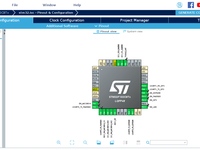
Graduation Design - Sensor Network Development Log
Welcome to my third development log. In the two previous logs, I discussed the pitfalls I met in the RoboMaster competition and FPGA course final project.This time I will be talking about my graduate design project, an air quality sensor network built by a 3-person group. The whole project is structured as follow:Obtain data from installed sensor modules and upload them to InfluxDB running on a serverSensors we used:MiCS6814, measures NO2, CO, and NH3Analog outputBME680, measures temperature, humidity, atmospheric pressure, and TVOCI2C interfacePMS5003, measures particle mattersUART serial outputExtra modules:ATGM336H, global positioning module with GPS+BeiDou supportUART serial outputESP8266, a widely used Wi-Fi moduleUART serial outputMH-CD42,...
Cyclone IV FPGA Development Log
Last semester, the school offered a digital systems course, which involves development on FPGAs. At the end of the course, we need to gather in groups and achieve some complicated functionality with the flexible architecture of FPGA, such as creating a game or running a convoluted neural network. We are free to add extra functionalities as we wish.Our group has done a game similar to Raiden, or controlling a fighter jet and attacking enemies with bullets. In addition to course requirements, we implemented these extra functionalities:A 640x480 VGA framebuffer with 16-bit color depth, stored on SRAM chipNaturally, Simplified Chinese fonts are included (full UTF-8 Chinese range, but without punctuation marks, since they are out of that range and we're kinda lazy)...
RoboMaster Development Log (Updated 2018-05-28)
Our school organized a RoboMaster team and planned to attend the competition this year. Since we are all new students at a new campus, we do not have any reference materials available from previous students, and we have to figure out bugs after bugs on our own.This post describes some of the problems we met during software development.Hardware: RoboMaster Official Development BoardMCU Model: STM32F427IIHxSoftware: ChibiOS 18.2.0Board Has 12 MHz HSE Clock Instead of Commonly Seen 8MHzThe pitfall is that neither the manual nor the hardware schematics mentioned the clock frequency.Due to this problem, the actual frequency we programmatically set with STM32CubeMX or other software is much higher than expected. This caused the following problems:...